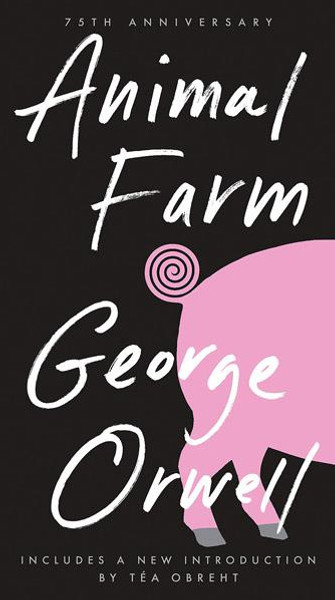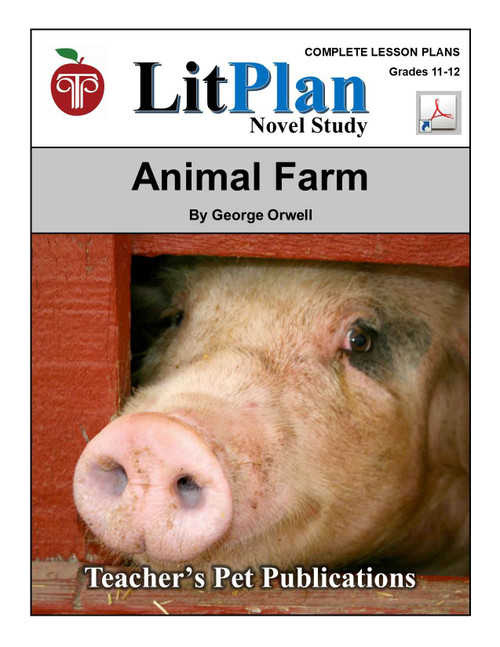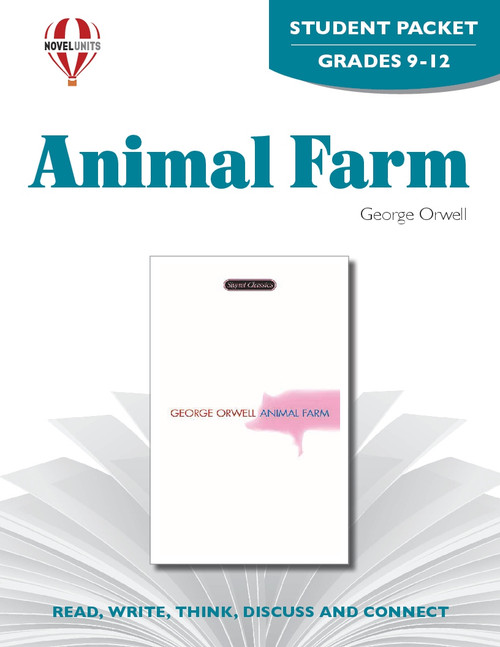Product Overview
Animal Farm: Some Animals Are More Equal Than Others
Through this allegorical narrative, Animal Farm addresses the themes of power, corruption, and inequality.
Ordering Books for Animal Farm
There's no order minimum; you can order just one copy if that's all you need! :-) Order your class set of Animal Farm books now, and take advantage of our bulk order discounts!
About the Book Animal Farm |
First published in 1945, George Orwell's Animal Farm is a dystopian allegory where animals rebel against their human farmer, hoping to create a society where the animals can be equal, free, and happy. It is an amorphous mirror to the Russian Revolution and the rise of Stalinism, but its truths are universal and traverse through various historical periods and political climates. As the narrative unfurls, Animal Farm's principals – the pigs – set up commandments to ensure equality. Yet gradually, these tenets of equality are undermined, and the pigs themselves become as corrupt as the humans they ousted. The plot renders a stark and poignant portrayal of societal shift, the corruption of power, and the complexities of leadership. At first glance, Animal Farm might seem strictly tethered to history and political science classes, but its relevance extends well into language arts. The text not only serves as a window into past events but also as a mirror to the mechanics of human behavior and the nature of power. By teaching Animal Farm, you can facilitate discussions around social structures, propaganda, and individual rights, aligning with educational standards while igniting a passion for critical reading and scholarship. |
Themes in the book Animal Farm |
The Corruption of Power: One of the central themes in Animal Farm is the corrupting influence of power. Orwell illustrates this through the rise and fall of the pigs who lead the revolution against the human farmer, Mr. Jones. Initially, the pigs advocate for equality and the betterment of all animals. However, as they consolidate power, their actions become increasingly self-serving and oppressive. The Betrayal of Ideals: Orwell's novella vividly depicts the betrayal of the original ideals of Animalism. The Seven Commandments, which initially encapsulate the principles of equality and justice, are gradually altered to justify the pigs' actions. This theme serves as a critique of how revolutionary ideals can be manipulated by those in power. The Role of Propaganda: Animal Farm also explores the role of propaganda in maintaining control over the populace. Squealer, the pig, is instrumental in spreading misleading information to the other animals to placate dissent and consolidate the pigs' authority. This theme underscores the power of language and rhetoric in shaping perceptions and controlling societies. The Danger of a Naive Working Class: Orwell portrays the working-class animals, particularly Boxer the horse, as hardworking but naive. Their blind trust in the leadership and lack of critical awareness contribute to their exploitation. This theme serves as a cautionary tale about the importance of education and critical thinking. The Inevitability of Class Stratification: Animal Farm ultimately suggests that class stratification is an inevitable outcome of societal structures. Despite the initial promise of equality, the farm ends up with a clear hierarchy, mirroring the human society it sought to overthrow. This theme invites reflection on the challenges of achieving true equality. |
Activity Ideas for the book Animal Farm |
The Language of Revolution: Digging into the language of the farm's evolution from "Four legs good, two legs bad!" to "Four legs good, two legs better!" is particularly insightful. Students can analyze these subtle changes and how they mirror the euphemistic slippage in real political discourse. Assigning students to create a glossary – a 'New-speak' – as they read can help them chart the evolution of language within the text. Interactive Timeline Activities: Create a comprehensive timeline covering key events in the book and their real-world counterparts, such as Old Major's speech mirroring Karl Marx's philosophies and the various decrees issued that reflect the stages of Communist interaction. Have students place these events on a historical timeline to understand their chronological significance and their long-term impacts on the society they have helped create. The Role of Propaganda: One of the more insidious lessons of Animal Farm is the power of propaganda, encapsulated in Squealer's deceptive messaging and the rewriting of history by the pigs. Examine with students the many forms of propaganda used then and now, and its role in shaping public perception and policy. Conceptual Vocabulary: Students must grasp the weight carried by terms like 'equality,' 'justice,' and 'class' to fully unpack the book's messages. Through discussions and presentations, have them map out each concept's evolution within the story and its relevance to our world. Role Play and Character Monologues: Have students step into the hooves and paws of the 'revolutionary' animals. What would Boxer say if he had the chance to address the other animals before he meets his unfortunate end? How would Napoleon justify his tyrannical actions? Task groups with performing these monologues, and watch the deeper layers of each character emerge. Podcast or Vlog Creation: Encourage students to modernize the allegorical tale by creating podcasts or vlogs that discuss the events of Animal Farm in the context of social media or contemporary news. This exercise can be an imaginative leap for students, requiring them to think critically about the application of Orwell's themes in a digital age. |

Customer Service
- We guarantee you'll have the best customer service experience ever with Teacher's Pet Publications.
- We are here to help make things as easy as possible for you!
- Your information is secure. We don't keep your card number on file anywhere, and we don't sell, rent, or give away your personal information.
- We treat you as we would like to be treated as a customer!
- Need help? Have questions? We're happy to assist you! Contact Us












